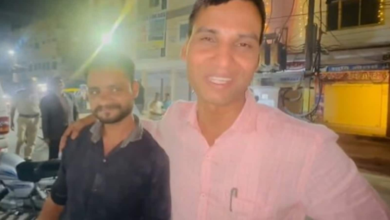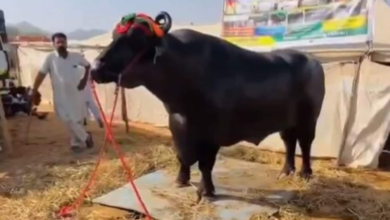Is Anek harbouring a saviour complex? Ayushmann Khurrana says ‘This is a film about the Northeast, and the protagons are of the Northeast’

Anubhav Sinha and Ayuhsmann Khurrana fielded questions about harbouring a saviour complex when they collaborated on the 2019 film, Article 15. Then, they were criticised for making an upper-caste policeman fight for the rights of Dalits. Now, in their latest project, Anek, which revolves around the plight of the people of Northeast India, Ayushmann is an agent, seemingly from the northern region of the country, who works in Northeast India and tries to restore peace in the region while focussing on its socio-political issues. And, just like the last time, when Ayushmann said Article 15 has a Dalit hero, this time, too, the actor has promised that not him, but many actors from the region play protagons in Anek.
“I don’t think we have diverted ourselves to that saviour complex which people get criticised for. This is a film about the Northeast, and the protagons are the actors of the Northeast. Till now, we have only seen character actors from the Northeast, but Andrea (Kevichüsa) is the lead actor, and she probably has an equal amount of screen time as mine. 70 per cent of the cast of the film is from the region. It’s their story, narrated them,” Ayushmann told while adding, “Hindi film industry is often criticised about representation, we have got the representation right for the first time, and I am really proud of it. It’s high time we talk about inclusivity and include this part of the country which is so beautiful and progressive.”
Article 15 earned critical acclaim but the appreciation didn’t translate into good box office numbers. Still, Ayushmann, who has given one commercial hit after another in films like Bala, Badhaai Ho, Andhadhun, Vicky Donor, and Bareilly Ki Barfi, wasn’t bothered and hopped on to Anek without any qualms. For him, Article 15 and Anek are not films that should be looked at with a “commercial lens.”
Asked if the success of Article 15 made it easier for him to sign the dotted line for Anek, Ayushmann promptly replied, “Absolutely”. He continued, “It’s the same genre as Article 15. It’s important and relevant cinema. The encouragement and adulation that people gave to Article 15 gave us the courage to move onto the next level with Anek.” The actor ensured that Anek would be a “good induction” for the Indian audience who have no idea about the social-political scenario in the Northeast or the upheaval over there. “They will be intrigued,” the actor said.
Besides Ayushmann, Anek also stars Andrea Kevichüsa in a pivotal role. Hailing from Nagaland, model Andrea is now making her acting debut. With the film, she has gotten a chance to prove that there is ample talent in the Northeast. The only requirement is: a platform to showcase the talent. “In Nagaland, there is a lot of untapped talent. There are some amazing filmmakers and actors. I can’t wait for them to come into the light and showcase their talent as well. I hope they get the representation that they deserve,” she shared.
Andrea was cast in Anek when the film’s director Sinha chanced upon one of her pictures. She never auditioned for the role. Now, as the film’s release date is approaching, she doesn’t know what to expect and is just taking everything “one day at a time”. For her, someone from Nagaland or the Northeast being given such a big platform “is a huge step” which has never been taken before.
Anek’s trailer also focuses on the discrimination that people from the region have to suffer at the hands of their fellow countrymen. But Andrea finds herself ‘privileged’ to have worked in an utterly professional environment to face any such discrimination. But she is habitual of hearing racial slurs like “chinki” and “Chinese” for herself. “I know of people from where I am from who do not have the privilege that I have. There have been really bad incidents that I would rather not share here. But I hope things change for them soon,” she said.
Ayushmann believes people who face discrimination are those who do not look like “generic Indians” and that is “very unfortunate”. He opined, “I don’t think I have faced any discrimination as such because I look like a ‘generic Indian’, that’s the stereotype that I have. I can look like someone from Gujarat, Punjab, UP, Bihar or Delhi, so I can get away with it. I come from a position of privilege. It’s more for the people who look different from generic.”
The actor also feels, “Though our film is based in the Northeast, it has a global connect in a way because discrimination is a ‘pralay’, its a disease everywhere, across the world.”
Ayushmann Khurrana during the shoot of Anek. (Photo: Ayuhsmann Khurrana/Instagram)
Though Anek is promoting the idea of diversity in the Indian communities, it is difficult to say if the Indian film industry is a unified place. After the success of RRR, Pushpa and KGF Chapter 2 recently, statements from celebrities suggest there is a North and South divide in cinema as well.
But Ayushmann suggests that this competition is futile because ultimately everything zeroes down to the audience’s preferences. “Pandemic has really evolved the taste of the audience. They are consuming entertainment which is beyond languages and the barriers of international borders,” the actor said. “It is just about the connect that you have to develop with the masses that will catapult that product into success, so it’s just that. There should be no competition,” he added.
Expressing his willingness to work in the South, Ayushmann shared, “I am a huge fan of Fahadh Faasil. I watch a lot of Malayalam cinema, it’s not typical commercial cinema.”







